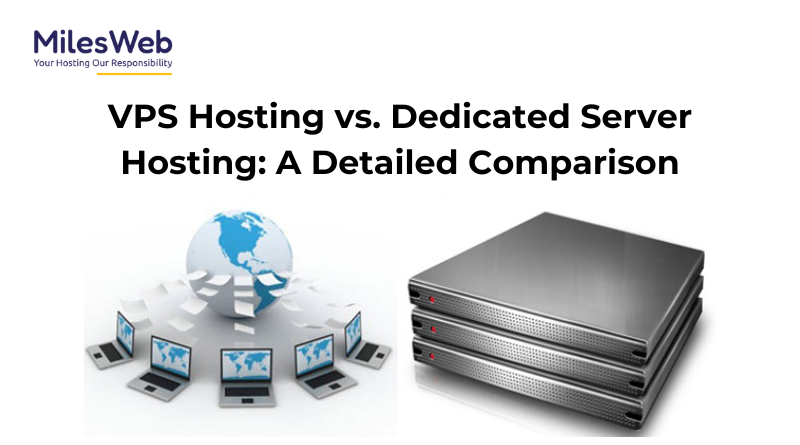
Every online business needs a stable and impressive web presence. This can be fruitful only if paired with the ideal web hosting partner. Selecting the appropriate managed server hosting services are imperative for all online businesses, be it a small blog or a vast eCommerce website. While shared servers are the first option, users with high business growth know they need more than basic shared hosting services.
Hence, two of the most common types usually considered after shared plans are VPS (Virtual Private Server) hosting and dedicated server hosting. Both provide more control and resources than shared hosting and fulfill different requirements with differing price ranges.
This article analyzes the major differences between VPS and dedicated server hosting so that you can make the right decision. With the advanced technology, you can also find trustworthy providers offering VDS server hosting as the middle-way option.
So let’s get the ball rolling and understand the basics:
What is VPS Hosting?
Think of a physical server as a pie. VPS hosting is equivalent to cutting that pie into many virtual pieces, where each piece represents an independent server environment. Each piece (VPS) is capable of fully functioning autonomously with its own operating system while utilizing RAM, CPU, storage, and a dedicated IP address.
While these VPSs are placed above the physical server, these environments are internally separated to stop one VPS from affecting the others’ performance. This separation is done with virtualization technology (KVM).
When to choose VPS hosting?
- Cost-Effective: VPS is cost-effective because of the value it delivers for the price you pay.
- Expanding websites/applications: If you primarily deploy a lot of web applications or expect growth, VPS is easy to scale.
- Regular traffic: Optimal for websites with consistent modest traffic and demanding resources.
- Require control: VPS servers offer more control than shared hosting; at the same time, all the major controls are still with the service provider to ensure users are not overburdened.
- No technical know-how: VPS hosting offers a testing ground for newbies with no technical expertise. Such users can opt for managed VPS servers and enjoy a hands-free web hosting experience.
What is dedicated server hosting?
With dedicated server hosting, you get the entire physical server all to yourself. In short, there’s no sharing of the physical server and resources; it’s wholly dedicated to your website only.
You have complete control over the server’s hardware, software, and configuration. This means you can customize it to your exact needs, use any operating system or other software you want, and have full root permissions.
When to choose dedicated server hosting?
- Huge traffic and resource intake: Dedicated services offer all resource limits just for your project. Thus, it’s perfect for websites or apps that receive an extensive volume of traffic and perform complicated tasks or activities.
- Supercharged performance: With dedicated resources, your website/apps will have the best performance and responsiveness.
- Optimal security: Unlike the shared server, dedicated hosting offers complete security and control of the system and data. Thus, you get a disruption-free hosting environment for your website/apps.
- Mission-critical applications: Dedicated hosting servers are also perfect for applications with zero tolerance for outages. With high-performing servers and dedicated resources, the possibilities of downtime are almost negligible and this is an important criteria for the mission-critical websites and applications.
VPS hosting vs. Dedicated server hosting: A head-to-head comparison
| Feature | VPS Hosting | Dedicated Server Hosting |
| Performance | It perfectly fits the requirements of most sites and apps. | Excellent option when an excessive amount of resources is needed. |
| Resources | Minimal customization, as there are specific settings for each VPS type. | You exclusively own the entire resource of the server. |
| Customization | Limits on customization do exist, but provided templates are available. | Broad modification options are available since it is full root access. |
| Scalability | Doctoring the resources is straightforward, although there’s a limit to how much it can be scaled. | Scaling is more challenging since usually the whole unit requires an upgrade. |
| Security | Good, separate working environment. | Excellent, the strongest possible control over security. |
| Cost | Good, as the cost per client is lower. | Significantly more expensive. |
| Control | Moderate, sufficient administrative control is provided on the VPS. | Total access is given to the entire server. |
| Technical Expertise | Moderate; some technical knowledge required. | High, strong technical skills are often necessary. |
| Maintenance | Almost everything (around 90%) is provided by the service host. | Users normally shoulder the responsibility. |
Making the right decision
When it comes to choosing between VPS hosting and dedicated hosting, you should consider your website requirements. This can be understood with the following questions:
- Budget: What is the cost limit you have allocated for hosting? It helps you choose between affordable VPS and expensive dedicated servers.
- Traffic: What is the expected traffic to your site? Moderated traffic can be handled with VPS servers, while high-traffic websites need dedicated hosting plans.
- Technical expertise: How versed are you in managing and configuring a server?
- Scalability: Are you expecting growth that requires increasing the resources available?
- Security: How safe does your data need to be? For instance, VPS servers, although isolated, are still prone to risks as they share the same server. While dedicated servers offer a high degree of security measures as compared to VPS hosting.
Summary
A VPS is ideal for many companies as it provides a powerful middle ground in terms of performance and control at a reasonable price. On the contrary, dedicated hosting servers offer long-term benefits for organizations growing rapidly.
Analyze your hosting needs and choose wisely. Remember, the plan depends overall on your web hosting requirements and business strategies. So go ahead and plan the best strategy combined with the right web hosting solutions for your online success.

